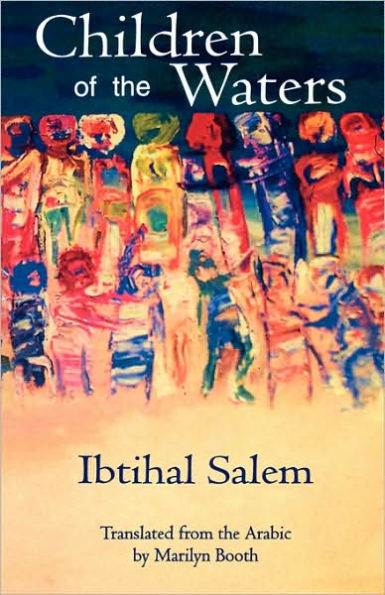Ibtihal Salem. Children of the Waters. Austin: University of Texas Press, 2003. 124 pp. (paper), ISBN 978-0-292-77773-6.
Reviewed by Therese Saliba (Third World Feminist Studies, Evergreen State College)
Published on H-Gender-MidEast (November, 2003)
With Arab women's writing increasingly available in English, Ibtihal Salem's new collection of short stories, poems, and vignettes offers a vibrant, though unsettling, look into contemporary Egyptian urban life. Salem's experimental style, with its dense prose and cross-genre writing poses challenges in translation. Yet Marilyn Booth provides the reader with an excellent translation, an informative introduction, and a brief preface to each piece that includes Salem's interview comments and explanations of terms, wordplay, customs, and socio-political realities to contextualize the work. Through innovative collaboration, the author and translator capture the vibrancy of Egyptians' "fierce desire for life despite all the hardships" (p. 51) and bring these stories to life for English language readers. Salem belongs to the "new generation" of Egyptian women writers that emerged in the 1970s, and Children of the Waters includes writings from 1974 to 1999 taken from three collections. As Booth writes in her introduction to Stories by Egyptian Women, women writers have often used the short story genre "as a vehicle for social and political comment."[1] In Salem's stories, the waters of the Nile, the Mediterranean, or Port Said serve as a major motif of political turbulence, of individual and collective longing. Booth adeptly describes Salem's writing as an "anchorage" beside these waters, where women wait for their men to return home from war or migrant labor, where poor families contend with the corruption and indifference of politicians and police, and where birth into poverty is war. Salem's stories capture the defeat of Nasser's nationalist vision, and the rise of economic and cultural globalization with the Infitah, the opening of Egypt's markets to the West. Salem experiments with lyrical compression to level a critique against the economic and gender inequalities, the political corruptions and powerplays that plague Egyptian society from without and within. In "My Friend 'Patriot,'" for example, the female narrator sits alone in her room (or cell) with the television blaring news of the Gulf War, repeating the word "Patriot" as scenes of destruction flash across the screen. These scenes, juxtaposed to a commercial with a blonde model selling a whitening detergent also called "Patriot," make ironic comment on the violence of this white-washed war, sold as another product for consumption. Salem's starkly drawn vignettes capture a world where material and social pressures collide with ideals of love, freedom, and nation. Yet through the intimate details of everyday lives, it is the gestures of human connection that restore dignity to the desperate, the emaciated poor, women, prisoners, those left behind by the forces of globalization. In Salem's writings, women's roles are complicated by the authorities that bind them, by the protective pressures of family and community that often run counter to women's desires. Women are further marginalized by poverty, such as in "Making Bets," when two childhood playmates meet up again as adults, he driving his Mercedes (the khanzira or hog), she standing in the frosty night without a winter coat waiting for the bus. When she challenges him to experience the biting frost of poverty and want that he rejects from his childhood, this ironically "small world" (from the title of the Arabic collection) seems to collapse on itself, exposing the economic and gender inequalities that create immense distances between peoples. For women, the ultimate expression of freedom, "another recurring motif," is to run along the beach sands, unencumbered by their veils, barefoot, feeling the salty air like kites loose in the wind. The sea symbolizes this expression of freedom, for as the shaykh says in one story, "Children of the waters, you always go too far" (p. 43). Similarly, in "Shadow Puppets," Salem poignantly describes the ecstacy of the sea and sexuality, the memory of passion that has been replaced by the shadow of aging love in an aging marriage. Salem's Children of the Waters captures the literary experimentation and political and social turbulence of contemporary Egyptian society. It also makes excellent material for courses in women's studies, Middle East studies, and postcolonial literature for its stark glimpse of the intersecting forces of globalization, poverty, national and gender inequalities, and the fierce resilience of human desires and (com)passion.
[1]. Marilyn Booth, trans., Stories by Egyptian Women (Austin: University of Texas Press, 1991), p. 5.
Children of the Waters Review
Egypt's Turbulent Waters in Ibtihal Salem's Experimental Writings
By: Editor - on: Thursday 1 October 2009 - Genre: Book Reviews
Upcoming Events

Arabia Felix - Alarabia Alsaida in Bayt Yakan
April 15, 2025
Arabia Felix by Thorkild Hansen, and translated by...

A writer, a vision, a journey: a conversation with Professor Ilan Pappe
March 15, 2025
This event took place on 15 March, 2025 . You may...

مسافر يبحث عن ماء
February 17, 2025
تقيم نقابة اتحاد كتاب مصرشعبة أدب الرحلات تحت رعاي...

Online discussion of The Vegetarian by Han Kang Nobel Prize winner 2024
November 08, 2024
This discussion of Han Kang’s The Vegetarian...
